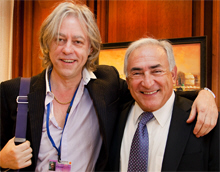
Typical street scene in Santa Ana, El Salvador. (Photo: iStock)
IMF Survey: IMF Invites Civil Society Input Into Governance Reform
June 26, 2009
- Move follows calls from civil society for voice in reform process
- Proposals to be channeled by independently run website
- Process to culminate at IMF-World Bank Annual Meetings in Istanbul
The IMF is asking civil society organizations (CSOs) for input into proposals to reform the way the institution is governed.

Africa Progress Panel member Bob Geldof (l) with IMF’s Strauss-Kahn: civil society sought voice in IMF governance reform (photo: Stephen Jaffe/IMF)
IMF AND CIVIL SOCIETY
An independently run website has been set up to help collate and synthesize the CSO input, which will feed into IMF staff’s preparation of governance reform papers for IMF Executive Board discussions before the IMF-World Bank Annual Meetings in October. The process will culminate in a meeting between IMF Managing Director Dominique Strauss-Kahn and CSOs during the 2009 Annual Meetings in Istanbul, Turkey.
The effort to involve CSOs in IMF governance reform—called the Fourth Pillar—follows calls from civil society for a voice in the process. The move started with a series of letters to civil society figures from Strauss-Kahn in late 2008 and also involved an April videoconference between Strauss-Kahn and CSOs on three continents.
Roles reassessed
Governance reform at the IMF is one of the most important tasks facing the institution. In March 2008, the Executive Board approved a resolution increasing the voice and participation of emerging market economies and low-income countries in the institution. Now further reforms are under consideration.
Additional proposals include a reassessment of the roles and responsibilities of the Board of Governors, the International Monetary and Financial Committee (IMFC), the Executive Board, and IMF Management, as well as procedures for selecting the IMF Managing Director. The Fourth Pillar—like the other three pillars—will inform a forthcoming Board paper on governance reform, which will be presented to the Board of Governors at the 2009 Annual Meetings in Istanbul.
The three existing pillars comprise work already done by
• The IMF’s Independent Evaluation Office, which released a report on “Governance of the IMF” in May 2008
• The IMF Executive Board, which is examining proposals from a Working Group on IMF Corporate Governance, and
• The Committee of Eminent Persons on IMF Governance Reform, which reported in March 2009.
The IMF uses the term civil society organization to refer to the wide range of citizens' associations that exists in virtually all member countries to provide benefits, services, or political influence to specific groups within society. CSOs include business forums, faith-based associations, labor unions, local community groups, nongovernmental organizations, philanthropic foundations, and think tanks. Usually excluded are branches of government—such as government agencies and legislators—and also individual businesses, political parties, and the media. Labor unions often distinguish themselves from CSOs.
Road to Istanbul
June 19: the CSO administrator has submitted the first round of core documents to the IMF staff who are writing a paper to be discussed by the IMF Board on July 22.
By Friday, July 10: the CSO administrator will draft a three-page paper compiling principles, recommendations, and issues to be submitted to the IMF Board for its meeting of July 22.
Mid-June to mid-August: CSOs will meet personally or by teleconference and/or video conference with IMF staff to discuss additional inputs, indicate priorities, and exchange views.
Late August/early September: an informal CSO meeting with the IMF Board is to be arranged.
Early September: CSO recommendations to be submitted.
October 6/7: at the IMF-World Bank Annual Meetings in Istanbul, Strauss-Kahn will meet with CSOs to discuss their inputs and proposals.
The IMF has invited the New Rules for Global Finance Coalition to coordinate the inputs and interaction with CSOs during the consultation period. The coalition is a Washington, D.C.-based organization that advocates advancing reforms of the governance and practices of international financial institutions.
The IMF is providing logistical support through the funding and development of the independent and interactive website, where CSOs can submit materials, engage in debates, and offer feedback. New Rules for Global Finance will be the sole administrator of the website.
Proposals can be submitted through the website, or directly to the IMF at ngoliaison@imf.org. A representation of submitted materials will be translated into French, Spanish, and English; translations in additional languages will be accommodated where possible.
Comments on this article should be sent to imfsurvey@imf.org







